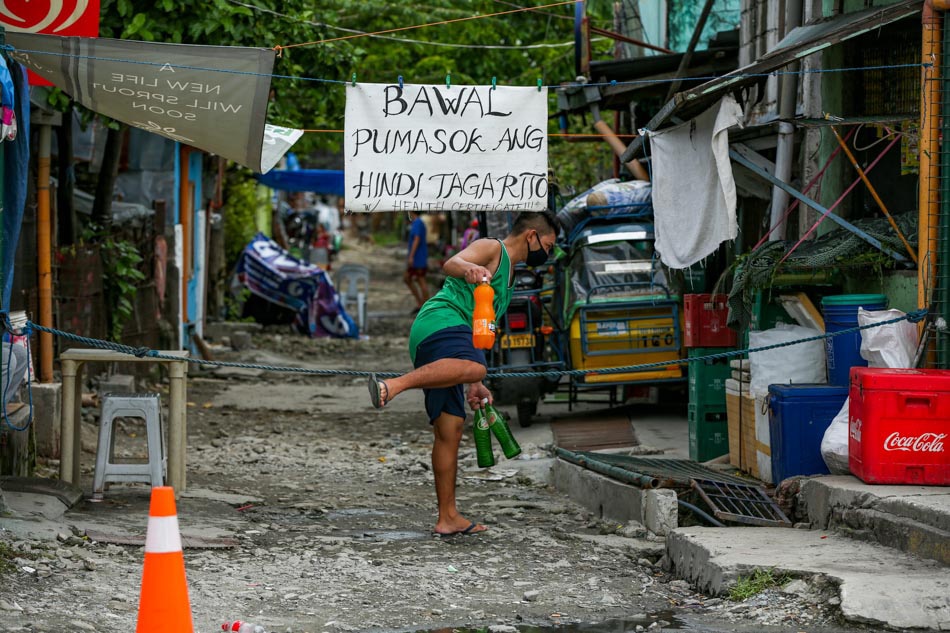'Highly unlikely' to keep Metro Manila under MECQ beyond Aug. 18: Palace | ABS-CBN

Welcome, Kapamilya! We use cookies to improve your browsing experience. Continuing to use this site means you agree to our use of cookies. Tell me more!
'Highly unlikely' to keep Metro Manila under MECQ beyond Aug. 18: Palace
'Highly unlikely' to keep Metro Manila under MECQ beyond Aug. 18: Palace
Arianne Merez,
ABS-CBN News
Published Aug 11, 2020 02:00 PM PHT
|
Updated Aug 11, 2020 02:03 PM PHT
MANILA - It is "highly unlikely" for Metro Manila to remain under modified enhanced community quarantine or MECQ beyond Aug. 18, Malacañang said Tuesday as it admitted coping with depleting resources to respond to the coronavirus pandemic.
MANILA - It is "highly unlikely" for Metro Manila to remain under modified enhanced community quarantine or MECQ beyond Aug. 18, Malacañang said Tuesday as it admitted coping with depleting resources to respond to the coronavirus pandemic.
The government no longer has resources to provide aid to poor families in the capital region and neighboring economic hubs should the strict lockdown be extended, Presidential Spokesperson Harry Roque said.
The government no longer has resources to provide aid to poor families in the capital region and neighboring economic hubs should the strict lockdown be extended, Presidential Spokesperson Harry Roque said.
"Tingin ko po, mahihirapan manatili sa MECQ dahil nga wala na po tayong pang-ayuda," Roque said during a Palace press briefing.
"Tingin ko po, mahihirapan manatili sa MECQ dahil nga wala na po tayong pang-ayuda," Roque said during a Palace press briefing.
(I think it will be difficult to retain MECQ because we no longer have resources for aid.)
(I think it will be difficult to retain MECQ because we no longer have resources for aid.)
ADVERTISEMENT
"Ano naman ang gagawin natin sa ating mga kababayan kung hindi sila pupwedeng magtrabaho at wala ng pang-ayuda?" he added.
"Ano naman ang gagawin natin sa ating mga kababayan kung hindi sila pupwedeng magtrabaho at wala ng pang-ayuda?" he added.
(What will we do if our countrymen cannot work and we can no longer provide aid?)
(What will we do if our countrymen cannot work and we can no longer provide aid?)
President Rodrigo Duterte on Aug. 4 reverted the capital region, and nearby provinces Bulacan, Laguna, Cavite, and Rizal to MEC following the appeal of health workers for a "time out" as COVID-19 cases in the country continued to surge.
President Rodrigo Duterte on Aug. 4 reverted the capital region, and nearby provinces Bulacan, Laguna, Cavite, and Rizal to MEC following the appeal of health workers for a "time out" as COVID-19 cases in the country continued to surge.
The tighter restrictions in the country's urban hubs were announced as the economy shrank by 16.5 percent in the second quarter, plunging into recession.
The tighter restrictions in the country's urban hubs were announced as the economy shrank by 16.5 percent in the second quarter, plunging into recession.
The 16.5 percent contraction- which wiped out gains from the administration of late President Cory Aquino up to her son, former President Noynoy Aquino III - was "much worse" than government economists expected, bringing the country into recession again in nearly 30 years.
The 16.5 percent contraction- which wiped out gains from the administration of late President Cory Aquino up to her son, former President Noynoy Aquino III - was "much worse" than government economists expected, bringing the country into recession again in nearly 30 years.
Malacañang earlier said that the reversion of Metro Manila and nearby provinces to MECQ was a "compromise" for the call of health care workers for a "timeout" and an opportunity for the government to recalibrate its COVID-19 pandemic response strategy.
Malacañang earlier said that the reversion of Metro Manila and nearby provinces to MECQ was a "compromise" for the call of health care workers for a "timeout" and an opportunity for the government to recalibrate its COVID-19 pandemic response strategy.
But while the MECQ is expected to help slow the spread of the virus, it is also expected to take a toll on the livelihood of Filipinos as nearly 70 percent of the economy is based in the capital region and surrounding provinces.
But while the MECQ is expected to help slow the spread of the virus, it is also expected to take a toll on the livelihood of Filipinos as nearly 70 percent of the economy is based in the capital region and surrounding provinces.
"Bottom line is wala na tayong pang-ayuda," Roque said.
"Bottom line is wala na tayong pang-ayuda," Roque said.
(The bottom line is we no longer have resources for aid.)
(The bottom line is we no longer have resources for aid.)
Major parts of the Philippines have been under quarantine since mid-March to curb the spread of COVID-19, which was first recorded in the country on Jan. 30 in a woman who arrived from the Chinese city of Wuhan where the disease is believed to have first emerged.
Major parts of the Philippines have been under quarantine since mid-March to curb the spread of COVID-19, which was first recorded in the country on Jan. 30 in a woman who arrived from the Chinese city of Wuhan where the disease is believed to have first emerged.
Despite having one of the strictest and longest lockdowns in the world, the Philippines continues to grapple with a surge in infections, recording a record-high of 6,958 additional cases in a single day on Monday.
Despite having one of the strictest and longest lockdowns in the world, the Philippines continues to grapple with a surge in infections, recording a record-high of 6,958 additional cases in a single day on Monday.
So far, the Philippines has confirmed 136,638 COVID-19 cases, including 2,293 deaths and 68,159 recoveries.
So far, the Philippines has confirmed 136,638 COVID-19 cases, including 2,293 deaths and 68,159 recoveries.
Read More:
MECQ
modified enhanced community quarantine
MECQ Metro Manila
MECQ Laguna
MECQ Cavite
IATF MECQ
ADVERTISEMENT
ADVERTISEMENT


